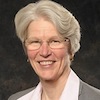A tech executive with nearly 40 years under her belt offers some lessons learned.
By Kris Rinne (Senior Vice President – Network Technologies, AT&T Labs)
As a senior female executive overseeing network technology, I’m all too aware that I’m a minority. But I’ve never let the confines of male-dominated roles restrict me – nor should any woman. While it’s been challenging at times, I don’t believe the road to success was meant to be easy. It’s the speed bumps, potholes and detours that build character, that make you a better you. Nonetheless, it never hurts to have a roadmap as you navigate your way to the top. Here’s my advice.
Learn to Solve for New Equations
If we fail to stay ahead, we risk falling behind. When I joined AT&T 36 years ago, a customer’s phone was fastened to a wall. If you wanted to call your friends and relatives in another city or state, you used long distance, which was expensive and best done late at night when the rates came down.
When I moved to the wireless side of the business in 1992, it became clear that rapid changes in technology were going to transform society. The growth in the number of U.S. wireless customers and the rate of penetration in the decade at the beginning of the 21st Century indicated the changes to come.
As these numbers grew, so did the complexity of the network and sophistication of devices. The technology that many of you consider essential to your daily life – like smartphones, fast mobile data speeds, and must-have applications – came as we transformed the wireless network. In 21 years, we upgraded the technology that powers the network seven different times. In many cases, this meant new switches, software, antennas, devices and huge changes in network architecture.
Needless to say, I’ve seen a lot of change throughout my career, and there’s no doubt that there’s more to come. But I embrace it. Change offers new equations that need to be solved for, which means opportunities for learning and growth. It’s important to note that I don’t wait for change to come to me. I seek it out because once it’s here, it’s too late. The world moves too fast to not be proactive.
Whether you work in a STEM field or not, you aren’t adding value if you’re simply accepting the status quo. It’s our job to break new ground. And continuous learning is the only way to stay ahead of the game – to have the foresight to not just see what’s coming next, but to adapt to it, plan for it and remain relevant throughout it.
Understand the Importance of 168
My idea of success involves a whole lot more than work and education. To be a true success, you need to get into the habit of getting involved and giving back.
With only 168 hours in a week, it’s not easy to find balance. Budgeting those hours between work and family is difficult enough, so it’s easy to let the hours owed to giving back add up in our IOU column.
However, there’s something to be said about the fulfillment of giving back. Whether it’s supporting a cause you are passionate about or mentoring other men and women in their journey to success, take the time to connect with the community and people around you. In doing so, you just might find that you are a bit better at your job – whether from improved time management, clarity gained from stepping away or the new perspectives you are able to bring back to your work.
Find the Perfect Pair
Mentoring is vital to our growth. My first mentors were my parents. As one of my elementary school teachers, my mother passed the joys of learning to me, and my father passed on my thirst for understanding how things work, teaching me by example – and patience.
Another mentor changed my future. My plan was to be a math teacher and basketball coach, but a college professor encouraged me to interview with the then Southwestern Bell, and the rest is history.
Mentors can come in all forms. I’ve learned so much from both men and women throughout my career, so if you don’t have a mentor already, seek someone out who will be excited and engaged in a project for a period time that you are working on – or who will give you straight and honest feedback about how you handled a situation.
Think also about becoming a mentor. You never know the difference you can make in someone’s life through a little guidance and encouragement.
Numbers don’t lie, and one thing is clear: we are in the red when it comes to women in STEM careers. This imbalance is unfortunate, but it also means we have a lot of opportunity to create change. You might just find a young lady who needs just a little encouragement to start a lifelong, fulfilling career in a STEM field.

Image credit: Frederic BISSON via Flickr.

